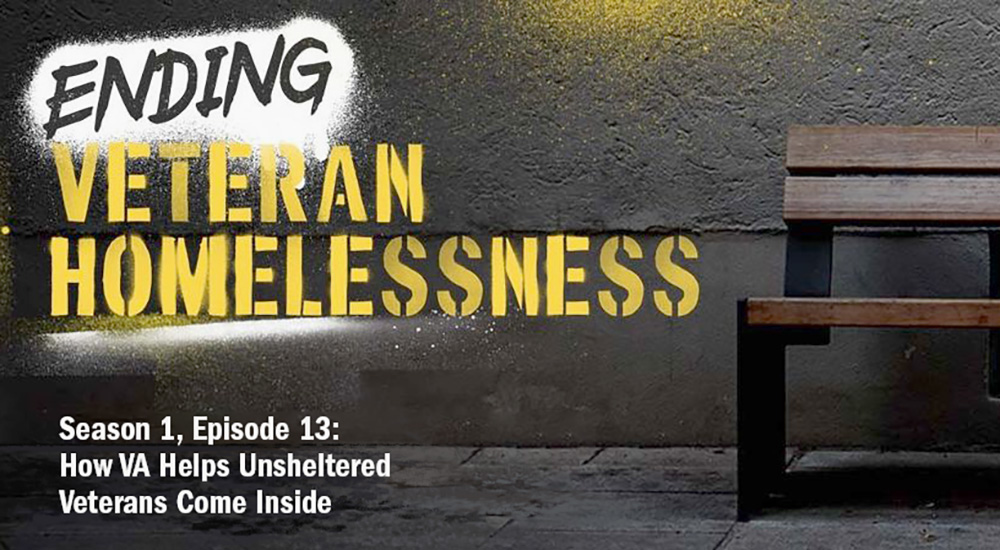While there was an overall increase of people experiencing unsheltered homelessness across the country from 2015-2022, VA and its partners saw a 16% decrease in unsheltered homeless Veterans over the same period. Even with this success, there is still a significant need for systemic change in many regions nationwide to address this issue.
On this month’s Ending Veteran Homelessness podcast, we are joined by Allison Bond, deputy director of the Heath Care for Homeless Veterans Program and Anthony Love, the principal advisor to the executive director for Intra/Inter-Agency Collaboration and director of Community Engagement in the VHA Homeless Programs Office, to learn about the experience of unsheltered homelessness among Veterans.
Listen to “S1EP13: How VA Helps Unsheltered Veterans Come Inside” on Spreaker.
Living unsheltered
The experience of sheltered homelessness varies greatly from that of unsheltered homelessness. While someone who is sheltered may spend their nights in emergency shelters or temporary housing, an unsheltered person is literally sleeping on the street, in a car, or in an abandoned building—anywhere not meant for human habitation.
The distinction is significant, and one that led VA to create a goal to specifically engage with 28,000 unsheltered Veterans in calendar year 2023.
For many, it can be easy to generalize the experience of homelessness as something a person chooses or something that happens due to a lack of effort or care. This common misconception can be dangerous and dehumanizing.
“We can assume that every single person that is experiencing homelessness has had some type of traumatic experience. There are infinite hardships that can lead to a person experiencing homelessness, and keeping that in mind can help the public to recognize and sympathize with their unfortunate circumstances, no matter the cause. I think that’s very important to remember, that they are citizens; they are humans and they’ve experienced a loss,” Bond said.
Those experiencing unsheltered homelessness also face significant short- and long-term health impacts that can make homelessness even more difficult to overcome. These challenges, added to unsheltered homelessness, can unfortunately be a mutually reinforcing cycle.
VA’s impact
With a significant issue like unsheltered homelessness, which has many causes, there are many different approaches to solving it.
Across the country, VA medical centers are participating in outreach, which is proving to be valuable in reaching Veterans where they are. Social workers partner with peer support specialists, many of whom are Veterans themselves, to bring Veterans into the system to get help.
The Biden-Harris Administration recently announced the launch of “ALL INside,” a first-of-its-kind initiative to address unsheltered homelessness across the country. ALL INside is a key part of All In: The Federal Strategic Plan to Prevent and End Homelessness. The plan set a bold goal to reduce homelessness by 25% by 2025 and ultimately build a country where every person has a safe and affordable home.
The U.S. Department of Housing and Urban Development recently awarded nearly $500 million in grants to address unsheltered homelessness, as well as rural homelessness, which will positively impact more than 60 communities.
What you can do
If you’re wondering what you can do to help achieve an end to unsheltered Veteran homelessness, there are a number of steps you can take to make a difference.
If you know or see a Veteran who is homeless or at risk of homelessness, make the call to the National Call Center for Homeless Veterans at 1-877-4AID VET (877-424-3838), where trained counselors are ready to talk confidentially 24 hours a day and 7 days a week.
For housing partners or landlords, learn how to accept HUD-VASH vouchers from Veterans and consider setting aside some units for low-income Veterans and their families.
Business owners can make an impact by considering hiring Veterans who are exiting homelessness. Learn more about how to do so by contacting your local Community Employment Coordinator.
One of the simplest ways to help a Veteran experiencing homelessness in your day-to-day life is by acknowledging them and offering a small kindness: a bottle of water on a hot day, a bag of dog food for their pet or a meal to help carry them through to their next one.
Instilling this basic hope may be the step that empowers a homeless Veteran to seek help at their local VA.
Learn about VA programs
- If you’re a Veteran who is homeless or at risk of homelessness, call the National Call Center for Homeless Veterans at 877-4AID-VET (877-424-3838).
- Visit the VA Homeless Programs website to learn about housing initiatives and other programs for Veterans exiting homelessness.
- Check out the Ending Veteran Homelessness podcast to learn more about what VA is doing about Veteran homelessness.
- Learn about how to get involved with housing homeless Veterans.
For more stories like these, subscribe to the Homeless Programs Office newsletter to receive monthly updates about programs and supportive services for Veterans experiencing or at risk of homelessness.
To read more stories about how VA is combatting Veteran homelessness, visit VA News and Information.
Topics in this story
Link Disclaimer
This page includes links to other websites outside our control and jurisdiction. VA is not responsible for the privacy practices or the content of non-VA Web sites. We encourage you to review the privacy policy or terms and conditions of those sites to fully understand what information is collected and how it is used.
More Stories
The Medical Foster Home program offers Veterans an alternative to nursing homes.
Watch the Under Secretary for Health and a panel of experts discuss VA Health Connect tele-emergency care.
The 2024 National Veteran Suicide Prevention Annual Report provides the foundation for VA’s suicide prevention programs and initiatives.







The only solution to end veteran homelessness is to provide new options for affordable, permanent housing. Join us at Mighty Hero Homes to implement the solution.